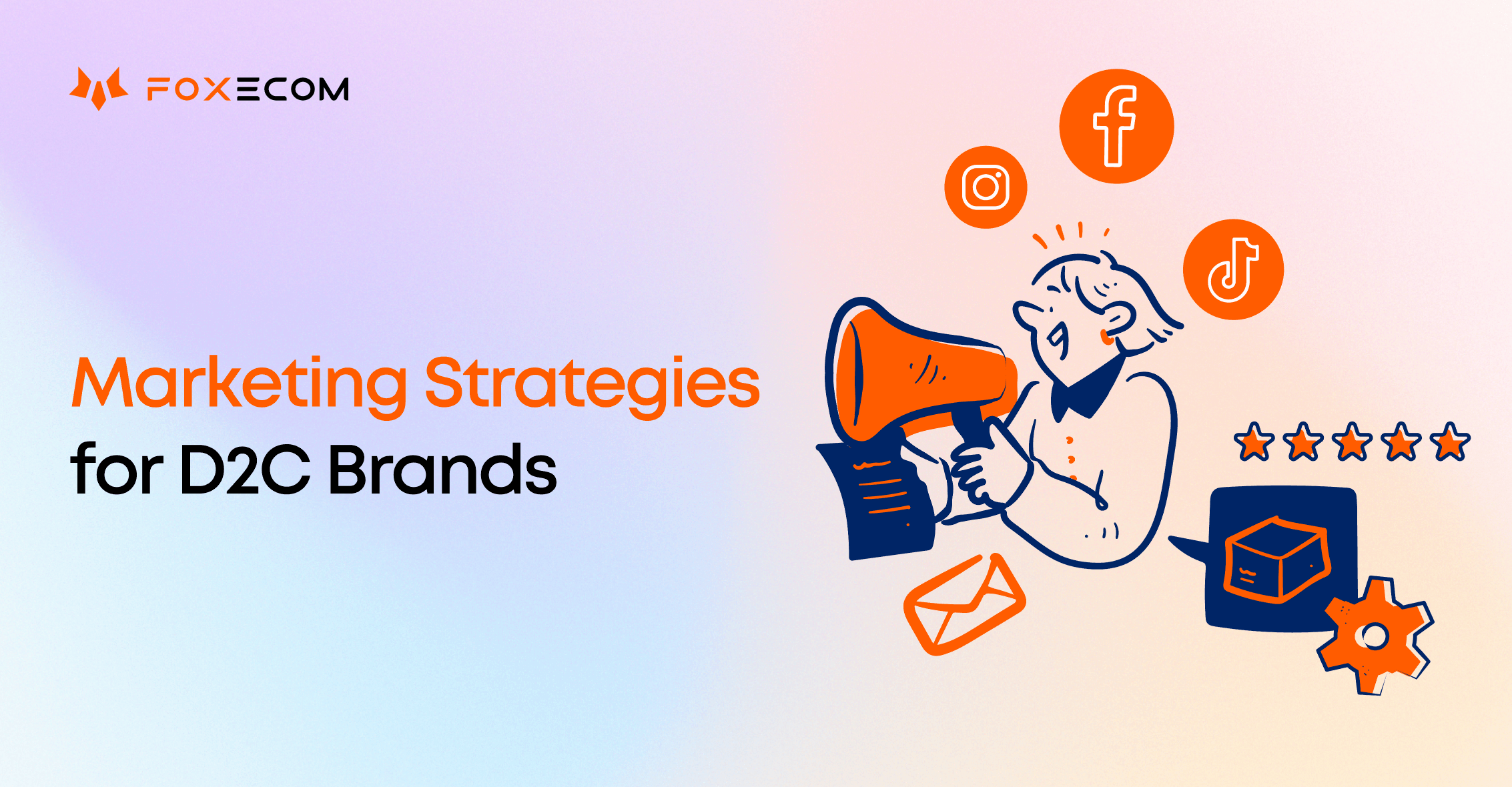Introduction
While retail eCommerce experienced a slowdown post-COVID-19, it continues to exhibit steady sales growth. KPMG predicts the sector will reach $7.4 trillion by 2025, with a 12% CAGR since 2020. Recognizing its long-term potential, D2C brands must adapt to the dynamic 21st-century economy. A strategic focus on D2C marketing is crucial for survival and scaling in this competitive landscape.

Source: KPMG
Direct-to-consumer (D2C) marketing has become a game-changing strategy for brands seeking to deepen their connections with customers. This approach not only strengthens relationships but also provides brands with valuable insights, enabling them to adapt to market trends and cultivate lasting loyalty swiftly.
In this article, we’ll dive into the core principles and explore top D2C marketing strategies that can help brands thrive and scale in today’s fast-paced digital world.
D2C marketing in a nutshell
What is D2C?
D2C (Direct-to-Consumer) is a business model where brands sell their products or services directly to customers, bypassing traditional retailers. This is typically done through the brand's own online or offline channels.

D2C model. Source: Unity Group
D2C eCommerce involves selling products directly to consumers through online stores, with popular platforms like WooCommerce, Shopify, BigCommerce, Magento, and Wix leading the way. To succeed in the competitive world of D2C, a strong marketing strategy is essential for any brand aiming to stand out in today’s crowded online marketplace.
🎉 To learn more about how to start a successful D2C business, read: What is D2C? An Ultimate Guide to Launch a Shopify D2C Brand
What is D2C marketing?
As previously mentioned, D2C marketing is a crucial strategy for increasing brand awareness and converting potential customers into loyal buyers.
D2C (Direct-to-Consumer) marketing refers to strategies and tactics that brands use to reach and engage consumers directly, without relying on intermediaries like wholesalers, distributors, or retailers. In a D2C model, the brand has full control over the customer journey, from product development and pricing to the buying experience and post-purchase support.
Core principles of D2C marketing strategies

Source: FoxEcom
Direct relationship
In D2C marketing, building a direct relationship with customers is essential. By connecting with customers personally, brands can offer customized recommendations and quick support. A strong direct relationship makes customers feel more connected to the brand, turning them into repeat buyers and advocates.
Customer data
By gathering information about what customers like, what they buy, and how they shop, brands can understand them better.

Customer Data is collected and processed via CDP. Source: CI&T
This data helps brands personalize experiences, like offering products they might be interested in or sending them targeted ads. Using customer data well makes customers feel more valued and improves their overall experience.
📍 Suggested Reading: How to Transform eCommerce Marketing Data into Profits
Brand experience
Brand experience is the overall impression customers form based on their interactions with a company. From website design to product quality and customer service, every touchpoint contributes to this perception.

Brand experience includes customer experience and user experience. Source: Air
In D2C marketing, a positive brand experience is crucial for building loyalty and encouraging repeat business. It's about creating memorable and satisfying interactions that make customers feel valued and happy.
📚 Related Article: eCommerce Branding: Connecting with Audiences on Facebook
Digital focus
Digital focus means using online tools and platforms to reach and connect with customers. In D2C marketing, this includes things like social media, email, and websites.

Source: Fintel Connect
By focusing on digital channels, brands can easily promote their products, communicate with customers, and see how well their strategies are working. It helps brands stay connected with their audience and make quick adjustments based on feedback.
🔥 Trending: How to Drive Traffic to Your Shopify Store
5 D2C eCommerce best practices
1. Build a strong brand identity
A strong brand identity is the cornerstone of a successful business. It's more than just a logo or slogan; it's the essence of your company, reflected in everything you do.
Develop a clear and compelling brand story
If people love a brand story, 55% are more likely to buy the product in the future, 44% will share the story, and 15% will buy the product immediately. Your brand story should explain what your brand does, what it stands for, and why it matters.
Start by figuring out the main purpose of your brand - what problem are you solving, and why is it important? Turn this into a story that feels real and connects with people emotionally. Mention key moments, challenges you’ve overcome, and the difference you want to make.
A strong brand story sets you apart from competitors and helps build a closer relationship with your audience.
Patagonia is a standout D2C brand that has crafted a compelling brand story rooted in sustainability.
Their narrative centers on being a sustainable outdoor apparel company committed to combating climate change through both high-quality products and dedicated activism. Patagonia discourages consumers from buying unnecessary products, emphasizing quality over quantity. It prioritizes recycled, organic, and responsibly sourced materials and commits to donate 1% of its sales to environmental causes.
While other brands have made strides in sustainability, Patagonia’s holistic approach, coupled with its unwavering commitment to environmental protection, sets it apart as a true industry leader.

Source: Patagonia Home Page
Create visually appealing and consistent branding
Do you know that consistent branding can boost your D2C revenue by up to 23%?
Create a consistent visual style that includes your logo, colors, fonts, and images. This style should match your brand’s personality and values. Use it everywhere - on your website, social media, and packaging - to make your brand easily recognizable and trustworthy.
📚 Related Article: Geometry in Web Design: How to Use Shapes for Impactful Layouts
Build a strong brand personality
Your brand personality is the way your brand talks, acts, and connects with people.
It’s the human side of your brand that customers can relate to. Whether your brand is fun, professional, or serious, keep this tone consistent in all your communications and interactions.
A strong personality makes your brand more relatable and memorable, helping to build customer loyalty.
Here are some statistics about brand personality:
- Trustworthiness is a paramount consideration for consumers, with 31% identifying it as the most critical brand attribute.
- Authenticity and honesty win on social media. 86% of shoppers prefer it.
- Political views are a sensitive topic. More than 60% of consumers say they'll stop buying from a brand that offends their political beliefs.

Source: The 12 brand archetypes
Nike, brand value of approximately 30 million USD in 2024, stood in first place (alongside Adidas) for the most well-known sneakers brand in the United States in 2023.
Nike has a clear and consistent brand message that encompasses an active brand archetype; the company promotes athleticism and determination. Its slogan, “Just Do It,” encourages people to push their limits and achieve their goals. This message is reinforced time and time again in all their marketing campaigns and communications.

Source: Nike
Nike's iconic swoosh logo perfectly mirrors the brand's personality, representing movement, speed, and achievement. Through relentless promotion of an athletic lifestyle and collaborations with elite athletes and sports teams, Nike has continually reinforced its performance-driven identity.
By effectively conveying its values and commitments to its audience, Nike has built a truly global brand. This consistency in brand personality has fostered a deep emotional connection with its audience, exemplifying how strong brand identity can drive both success and loyalty.
2. Build a strong online presence and digital channels
Establish a robust and user-friendly eCommerce platform
Choosing the right eCommerce platform is crucial for any online business.
It's the foundation on which your entire store operates. While there are several options available, Shopify stands out as an excellent choice for quickly launching a D2C business. Its comprehensive ecosystem provides everything you need to run a successful online store and implement D2C marketing activities.
Want to upgrade your store to Shopify Plus? Click the banner below to learn more!
Optimize mobile shopping experience
77% of customers prefer mobile shopping due to its convenience and flexibility. Therefore, it's crucial to prioritize mobile compatibility to ensure your visuals look great on all devices. To achieve this, consider choosing some themes that are optimized for mobile commerce. Here are some recommendations:
Zest - A mobile-focused theme that provides a high-quality modern mobile shopping experience with its fast loading times and responsive design.

Source: Shopify theme
With the majority of shoppers now using smartphones, having a responsive layout is essential for D2C eCommerce strategies. Zest’s versatile design and advanced features empower you to create visually stunning sections that drive conversions, fueling the growth of your online business.
Explore the Zest demo store to experience 5 distinct layouts tailored to industries such as beauty, fashion, and healthcare, and see how they perform across different sectors.
Sleek - Absolute For An Optimal Interactive Shopping Experience, which helps brands achieve a clean and modern website design easily.

Source: Shopify theme
Sleek offers a quick and easy setup process, so you can start selling faster. Perfect for healthcare, fashion, and beauty businesses, Sleek's clean design creates a beautiful shopping experience that can drive sales. Visit the Sleek store demos to learn more.
🔥 Related Articles
- How to Boost Mobile Optimization for Your Shopify Store
- 5 eCommerce UX Best Practices That Increase Sales
- eCommerce CRO: Top Conversion Rate Optimization Hacks to Double Sales
Implement search engine optimization (SEO) strategies
SEO boosts your website's visibility on search engines, attracting more potential customers. It involves a mix of technical, content, and link-building strategies. While SEO can be complex, it's a worthwhile investment. To learn more about SEO strategies for eCommerce, check out our reference docs below:
- The Industry Leading eCommerce SEO Guide
- Technical SEO Tips for Shopify: Improving Site Speed and Performance
- The Ultimate eCommerce SEO Audit Checklist: 12 Key Elements to Review
🔥 Expert Tips & Gifts:
- SearchPie: SEO Booster & Speed 20% OFF
- SEOAnt ‑ AI SEO Optimizer 30% OFF
- Avada SEO & Image Optimizer 30% OFF
Utilize social media platforms for engagement and advertising
Social media is a powerful marketing channel for D2C brands. Platforms like Instagram, Facebook, and TikTok offer unique opportunities to reach and engage with target audiences. To succeed, brands must understand each platform's content formats and develop tailored strategies to convert followers into customers.
Let’s take an example. Kylie Cosmetics boasts a massive following of over 25 million on Instagram and 3.5 million on TikTok. Their content strategy primarily focuses on showcasing products, offering behind-the-scenes glimpses, sharing user-generated content, partnering with influencers, and engaging with their audience through interactive features. This comprehensive approach has driven significant audience growth and high engagement on both platforms.

Source: Kylie Cosmetics’ Instagram

Source: Kylie Cosmetics’ Tiktok
⭐ You Might Also Like: Best Tips for Successful Instagram Giveaways
Implement email marketing for customer retention and nurturing
With 4.48 billion email users globally, the reach is immense. Analysts predict this number will continue to grow, reaching 4.59 billion in 2025 and 4.73 billion by 2026, proving it’s still relevant and has plenty of potential as a D2C marketing channel. Email marketing revenue worldwide is predicted to reach 12.33 billion in 2024, which makes it an important channel for D2C marketing strategies.

Source: Statista
Key components of email marketing include the following:
- List building
- Audience segmentation
- Crafting compelling campaigns: welcome emails, abandoned cart reminders, product recommendations, loyalty programs
- Automating processes
- Data analysis for optimization
Moreover, email marketing should be a key D2C marketing channel for sales seasons like Back Friday Cyber Monday, Summer sales, Christmas, etc.
To maximize defined results, consider leveraging email marketing platforms such as Omnisend, Klaviyo, Avada Email Marketing & SMS.
🎁 Expert Tips & Gifts: Omnisend Email Marketing & SMS: 10% OFF
3. Use data to enhance the customer experience
Customer data is a hidden treasure for businesses.
By understanding what your customers like and do, you can sell more and keep them happy. To track customer data, use tools like Google Analytics, Mixpanel, or Hotjar. These platforms help you follow what customers do on your website or app, so you can understand their behavior better.

Source: FoxEcom
Tracking and analyzing customer behavior involves monitoring and understanding how customers interact with your brand. This includes collecting data on website visits, purchases, social media engagement, and customer support interactions. For example, setting up Facebook Pixel correctly to capture valuable event data - thereby identify patterns, preferences, and pain points.
Using data to optimize marketing campaigns involves analyzing performance metrics, such as click-through rates, conversions, and ROI, to identify what works and what doesn't. This information is used to refine targeting, messaging, and budget allocation for better results.
Identifying customer segments and tailoring offerings means dividing customers into groups based on shared characteristics (like age, behavior, or interests) and providing products or services that specifically appeal to each group. This personalized approach enhances customer satisfaction and loyalty.
4. Focus on customer experience and loyalty
Research by Deloitte and Touche has shown that customer-centric companies are 60% more profitable than those with a less customer-focused approach. This compelling evidence underscores the critical importance of prioritizing customer experience as a fundamental building block for business success.

Loyalty programs generate 4.9X more revenue than what they cost. Source: Antavo
To do so, here are some key practices that D2C brands should take:
- Offer excellent customer service by providing customers with a variety of support channels, including live chat, email, and social media. Ensure rapid response times to customer inquiries. Building trust is essential, so maintain transparency in return policies to demonstrate confidence in your product. To efficiently manage customer relationships, consider implementing a CRM platform to track interactions and preferences.
- Customer loyalty is the cornerstone of long-term business success. By consistently delivering exceptional experiences, businesses can foster deep connections with customers. Implementing effective loyalty programs, actively seeking and responding to customer feedback, and creating a strong sense of community are essential strategies. To delve deeper into crafting a successful loyalty program tailored to your D2C business, explore How to Create a Loyalty Program.
🔥 Expert Tips & Gifts:
- UpPromote Affiliate & Referral: 20% OFF Forever
- Loloyal: Loyalty & Referral: 50% OFF
- AiT: Loyalty Program, Email: 20% OFF for 1 Year
5. Leverage Influencer Marketing
49% of consumers depend on influencer recommendations, according to the Digital Marketing Institute. Furthermore, 69% of consumers trust what influencers say and recommend. Influencer marketing is a strategic imperative in D2C eCommerce strategies aiming to expand their reach and drive sales.
Here is the cheat sheet for D2C brands on how to choose suitable influencers.

Source: upfluence
Furthermore, influencers have a diverse range of platforms to promote brands, but TikTok has rapidly transformed from a novelty app into a powerhouse for influencer marketing.

Source: Influencer Marketing Hub
With 55.5% of marketers now utilizing the platform, it's clear that TikTok has captured the attention of both brands and consumers. Unlike passive scrolling on other platforms, TikTok users are actively engaged, with 78% making purchases based on content they've seen. This presents a golden opportunity for brands to leverage influencer campaigns.
📚 Related Articles:
Summary
D2C marketing is a cornerstone of successful eCommerce strategies, offering brands direct control over customer relationships and brand narrative. To thrive, brands should consider these core strategies: building a strong brand identity, effectively utilizing digital channels, leveraging customer data for personalization, and partnering with influencers to expand reach, boost brand awareness, and finally a boom in sales.








